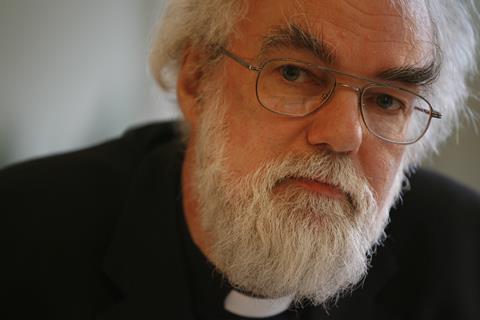Lord Williams of Oystermouth says many of the hymns sung at weddings and funerals, including ‘All things bright and beautiful’, are comparable to “baby food”. But hymn scholar Dr Daniel Johnson says churches should be sharing the treasures of the hymn tradition with as much joy as possible

A debate over the place of hymns in our society was sparked last week when Lord Lisvane wrote the following letter to The Times, “We are fortunate in this country to have such a splendid repertoire of hymns…Why, then, do we have to suffer All Things Bright and Beautiful? It is chosen by about half the participants in the weddings I play for (though I am often successful in helping them to choose something better)…I find the saccharine doggerel, combined with the jingly tune (not that easy for congregations to sing, actually), deeply depressing — especially when there are so many wonderful alternatives.”
In a subsequent Times news story The former Archbishop of Canterbury, Rowan Williams, now Lord Williams of Oystermouth, agreed there are many “great classics” and lamented how these had “fallen out of common memory”.
Lord Williams makes three points. Firstly, he fears that the hymn tradition is disappearing. I sympathise. Secondly, he recognises that Christianity is vanishing more and more from the collective consciousness of Britain, and with it the knowledge of Christ and the gospel. Again, I sympathise. But there’s a third dimension, which I want to push back on, and that is the relationship between elitism and nostalgia.
Williams stated that the songs that typically get chosen for weddings are “primary school”. This implies primary school is a way of describing things that have little cultural or intellectual value. But as a dad of four primary-aged children, I disagree. My kids study Shakespeare, read Tolkien and Lewis, understand the worlds of Marvel and Harry Potter, can play musical instruments, sing different parts in their choirs, learn lines in the school play, and know the offside rule. They can easily beat me at chess. Primary school children are emotionally mature enough to support friends through grief or change, welcoming refugee children from Hong Kong into their friendship groups. They can raise huge sums of money for charity. So “Primary school” is not synonymous with immaturity.
That said, let’s think about songs in Primary schools for a bit. Comedian Jason Manford recently released a charity single called ‘Assembly Bangers’. The medley isn’t compromised of asinine Victorian hymns, but rather the songs taken from the Come and Praise assembly hymn book, ‘Lord of the Dance’, ‘Give Me Oil in my Lamp’, ‘This Little Light of Mine’.
The success of Manford’s performance and single demonstrates how hymns occupy a nostalgic space. It seems most of us remember with fondness the hymns we used to sing in school assemblies. And clearly this is leading plenty of couples to choose such hymns for their wedding day.
I dearly love hymns, and think they have a vital role to play in the worshipping life of the Church. If I had my way, churches would sing a much broader range of traditional hymns and congregations would be more familiar with the works of Watts, Wesley, Steele, Cowper, and Newton. But if even churches don’t know these, it’s little wonder that those outside of the Church are unfamiliar with them. A starting point would be if churches committed to making sure those who lead their singing are as theologically and historically literate as they expect their preachers to be.
But, back to weddings. Why can’t the vicar give the couple a Spotify playlist of hymns to consider ahead of the big day? “Oh, so you’d like your wedding here because your grandmother went to a Methodist church when she was a child? Well, did you know that hymn-singing is deeply important to Methodists; here are some of their most significant hymns, I’ll text you a link so you can listen at home.”
Museums don’t criticise the visiting public for their lack of knowledge, they enthusiastically share the treasures they house. Churches, who hold the wonderful treasures of the hymn tradition, can share these with a lot more joy and a lot less condescension. Nostalgia is a powerful force, and is entirely appropriate at a wedding – a day when memories are held, shared, and created. But elitism doesn’t help anybody. Christianity has been drifting from the British public consciousness for a century or more. If churches and church leaders want to reverse this shift, maybe the answer is to be more welcoming of those unfamiliar with our history, and less condescending of those who receive our hospitality.
The goal of the Church is not to preserve particular traditions, but to see the gospel produce a worshipping congregation from every language and nation. When that day comes, I suspect we’ll care very little about what we are singing, and be far more caught up in who we are singing with, and who we are singing to.






































7 Readers' comments